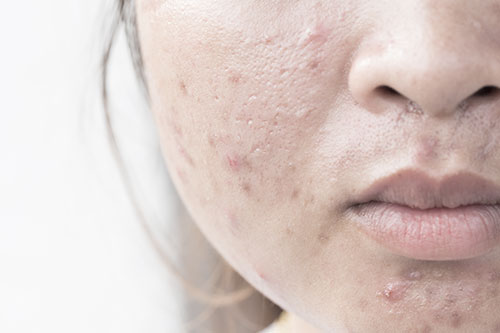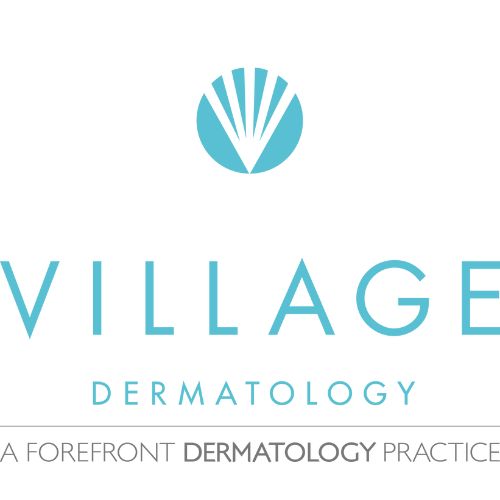Acne
WHAT IS ACNE?
Acne is a chronic, inflammatory condition that causes pimples and spots on the face, shoulders, neck, back, chest, and upper arms. It is a common skin condition in the USA and affects about 50 million Americans annually. Statistics show that at least 85% of Americans experience acne at least once between the ages of 12 and 24. Though acne is not dangerous to the body, it can leave scars on the body, which can cause emotional distress that no one likes experiencing. It affects teenagers more, though people of all ages suffer from it depending on several risk factors. These risk factors include genetics, menstruation cycle, pregnancy, changes in hormone levels, stress and anxiety, hot and humid climates, and using improper skincare products (just to name a few).
WHAT CAUSES ACNE?
Our skin pores are connected to oil glands. These glands produce sebum which carries dead skin cells through the follicles to the skin surface. Sometimes, the follicles get blocked, and oil is built up, leading to pimple formation. Furthermore, bacteria plays a significant role in the development of acne. Although everyone is prone to the condition, the risk factors of acne determine the frequency and severity of one’s acne.
SYMPTOMS OF ACNE
The symptoms of acne vary according to the severity of the condition. It includes closed plugged pores (whiteheads), open plugged pores (blackheads), papules (small red and tender bumps), pimples, nodules (large, solid, and painful lumps beneath the surface of the skin) and cystic lesions (painful pus-filled lumps beneath the skin surface).
HOW DOES ACNE MAKE YOU LOOK AND FEEL?
As mentioned earlier, acne has a substantial physical, mental, and emotional effect on a person. Having visible acne on parts of the body like the skin is a serious concern. This is because the spots are often so red, swollen, raw, and “angry-looking” that you feel like everyone notices and comments on your acne.
Sometimes, the acne sites stick out from the skin, and people could see that the lesion contains pus. This makes the surface uneven and lumpy, and again increases the mental disturbance because you feel like everyone notices . Often times the skin can be so protruded that makeup cannot cover it up, and even after the acne bump is gone, redness and scarring can remain for months.
Some individuals have high levels of anxiety around their acne, and it becomes a problem for some people suffering from acne to feel relaxed. Many people with acne feel embarrassed and uncomfortable, and the feeling is strong enough to prevent these individuals from doing things they want to do.
Besides the emotional and social effects, acne can be painful, especially deep and inflamed spots. Sometimes it feels like your face is on fire, and sometimes it feels like an insect bite. These physical symptoms can sometimes be so intense that an individual is tempted to pick, scratch, or squeeze the acne lesions for some sort of relief. This frequently leads to more breakouts and even longer healing times in individuals.
WHAT ARE ACNE SOLUTIONS?
Gentle or medicated cleansers and topical creams are most often used to treat acne breakouts. Sometimes these topicals can be used in combinations with oral antibiotics and/or hormonal therapies. In more persistent cases, other oral medications including isotretinoin may be prescribed. Every patient responds differently, so it is important to consult with one of our providers to see which regimen may work best for you.
Leaving acne untreated can cause scars, dark spots, and low self-esteem. Medications and products are important, but professional advice is needed to give the greatest chance for success. Our dermatologists and physician assistants understand all factors that influence acne. We consider all variables, including your unique “story”, creating a custom treatment plan to clear up your skin.
We also offer services that complement medical therapy for maximum effectiveness. Our aestheticians work with our doctors and physician assistants to provide treatments unique to your skin. This includes services like extractions, facials, and chemical peels. The Hydrafacial is a favorite among our acne patients.
Acne does not have to rule your life or determine your happiness. The great news is that there are several excellent options for many people that suffer from acne breakouts. However, each person is unique, and all factors must be taken into consideration before embarking on a treatment plan. Therefore, partnering with a skincare expert is the first step in the right direction towards clearer skin.
ACNE TREATMENT CONCLUSION
At Village Dermatology, we have the best dermatology providers and are positioned to give you the best solutions to your acne problems. We have many acne treatment options, and we will examine your condition and consider all factors when developing an acne solution for you.
We also offer services that complement medical therapy for maximum effectiveness. Our aestheticians work with our doctors and physician assistants to provide treatments unique to your skin. This includes services like extractions, facials, and chemical peels. The Hydrafacial is a favorite among our acne patients.
Shop our online store for your Acne Treatment products by clicking HERE
Fill out the form below to schedule an appointment with one of our medical providers.
"*" indicates required fields


